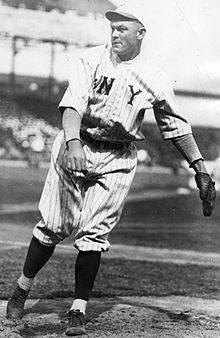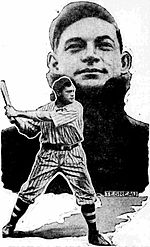Jeff Tesreau
| Jeff Tesreau | |
|---|---|
 | |
| Pitcher | |
| Born: March 5, 1888 Ironton, Missouri, U.S. | |
| Died: September 24, 1946 (aged 58) Hanover, New Hampshire, U.S. | |
Batted: Right Threw: Right | |
| MLB debut | |
| April 12, 1912, for the New York Giants | |
| Last MLB appearance | |
| June 11, 1918, for the New York Giants | |
| MLB statistics | |
| Win–loss record | 115–72 |
| Earned run average | 2.43 |
| Strikeouts | 880 |
| Teams | |
| Career highlights and awards | |
| |
Charles Monroe "Jeff" Tesreau (March 5, 1888 – September 24, 1946) [1] was an American Major League Baseball (MLB) player. Standing 6 ft 2 in (1.88 m), Tesreau was given the nickname "Jeff" because he resembled boxer Jim Jeffries.[2] He made his MLB debut in 1912.
Early life[edit]
Charles Monroe "Jeff" Tesreau was born on March 5, 1888, in Ironton, Missouri.
Professional career[edit]
Minor leagues[edit]
Tesreau initially signed with a minor league team of the St. Louis Browns in 1909. In 1910, his contract was purchased by the New York Giants.
After two years in the minors, Tesreau learned how to throw a spitball, which became his signature pitch.
New York Giants (1912–1918)[edit]
He started the second game of the 1912 season for the Giants. The New York Times wrote, "Tesreau has curves which bend like barrel hoops and speed like lightning. He's just the kind of a strong man McGraw has been looking for."[citation needed] Tesreau finished his rookie season with 17–7 record and on September 6 he would no-hit the Philadelphia Phillies, 3-0. He also had a National League leading ERA of 1.96. Earned run average officially became a statistic of Major League Baseball in 1912, and Tesreau, along with the American League's Walter Johnson, became the first players recognized for leading the major leagues in that category. That season he also led the NL in hits per 9 innings pitched (6.566); he also led the league in that category in 1913 (7.085) and 1914 (6.645).[3]
From 1912 to 1917, Tesreau remained a starting pitcher with the Giants. In 1918, he had an argument with manager John McGraw and quit the team in the middle of the season. In 1919, Tesreau refused to play for the Giants, and McGraw refused to trade or release him. He would not play another game in the major leagues.
In his career he was 119-72 (.623) with a 2.43 ERA.[3]
Tesreau held his opponents to a .224 batting average in his career, which was lower than Walter Johnson (.227), Christy Mathewson (.245) and Pete Alexander (.250) even though each pitched considerably longer than Tesreau.[2]
He was also a better than average hitting pitcher, posting a .216 batting average (124-for-574) with 40 runs, 2 home runs and 46 RBI. In six World Series games, he hit .300 (3-for-10) with 2 RBI. His highest salary, in the 1915-17 seasons, was $6,300.[3]
1912 World Series[edit]

In the 1912 World Series, Tesreau started three times, each against Boston Red Sox ace Smoky Joe Wood, and registered a 1–2 record for the Series. He started Game 1 of the Series and was credited with the loss in the 4-3 defeat but did not allow a hit for 5.1 innings (a triple by Tris Speaker broke up the no-hit bid). It is the longest no-hit bid by a rookie pitcher in World Series history and no rookie pitcher would throw five innings of no-hit ball in a Series start again until Ian Anderson in 2021.[4] His performance stood as the longest postseason no-hit bid by a rookie for 101 years until Michael Wacha broke the mark in 2013.[5] He was also credited with the loss in Game 4 before bouncing back in Game 7 (which due to a tie in Game 2 meant that the Series was even at three apiece), although the Giants lost in the decisive Game 8 the next day.
Post-playing career[edit]
Tesreau became the baseball coach for the Dartmouth Big Green baseball team of Dartmouth College, in 1919, a position he held until his death on September 24, 1946. He won 348 games as coach for Dartmouth, often coaching against Smoky Joe Wood, who had become the baseball coach for Yale University. He won four Eastern Intercollegiate Baseball League titles and was the alltime wins leader until he was passed by Bob Whalen decades later.
Death[edit]
Tesreau suffered a stroke while on a fishing trip in 1946. He died four days later.[2]
See also[edit]
References[edit]
- ^ "Jeff Tesreau Dies; Dartmouth Coach, Big League Star", Boston Globe, September 25, 1946, p. 12
- ^ a b c "Jeff Tesreau – Society for American Baseball Research".
- ^ a b c "Jeff Tesreau Stats, Height, Weight, Position, Rookie Status & More". Baseball-Reference.com.
- ^ Gonzalez, Alden (October 29, 2021). "Atlanta Braves' bullpen delivers after Brian Snitker pulls Ian Anderson in Game 3". ESPN.com. Retrieved 31 October 2021.
- ^ @MLBStats (October 23, 2021). "Luis Garcia was lights out. #Postseason" (Tweet) – via Twitter.
External links[edit]
- Career statistics and player information from Baseball Reference, or Baseball Reference (Minors)
- 1888 births
- 1946 deaths
- Major League Baseball pitchers
- National League ERA champions
- Houston Buffaloes players
- New York Giants (NL) players
- San Antonio Bronchos players
- Galveston Sand Crabs players
- Shreveport Pirates (baseball) players
- Toronto Maple Leafs (International League) players
- Dartmouth Big Green baseball coaches
- People from Perry County, Missouri
- Baseball players from Missouri
- People from Ironton, Missouri
